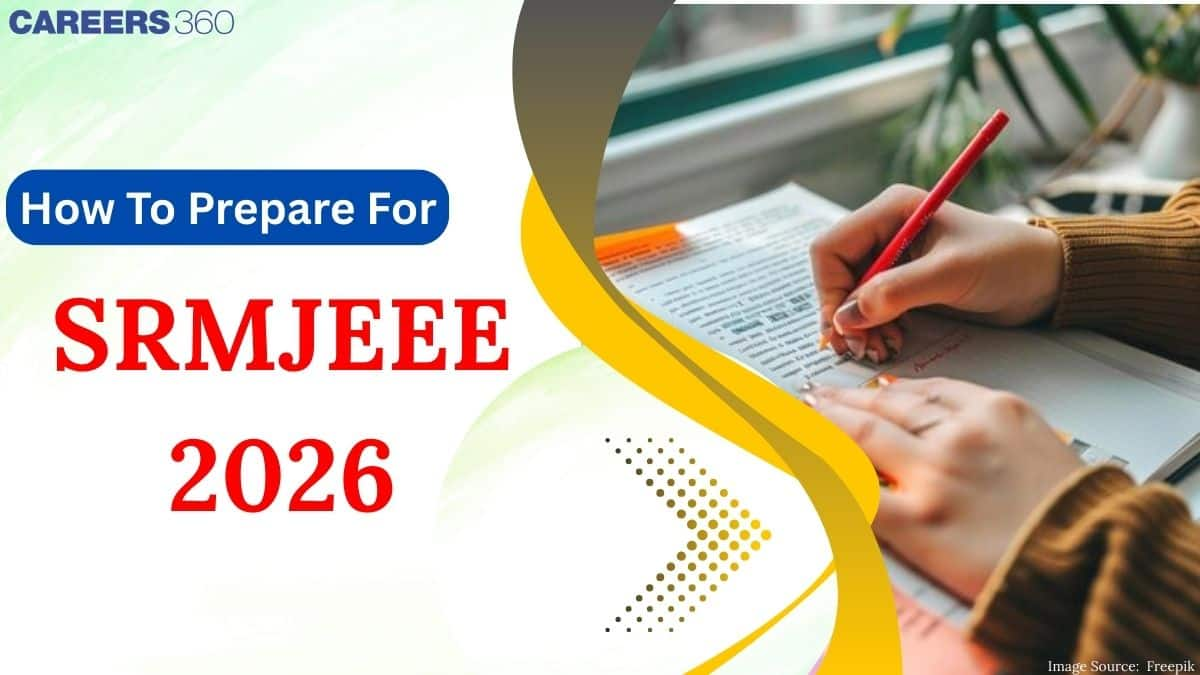UPES B.Tech Admissions 2026
Last Date to Apply: 28th Feb | Ranked #43 among Engineering colleges in India by NIRF | Highest Package 1.3 CR , 100% Placements
How to Prepare for SRMJEEE 2026 - Preparing for SRMJEEE 2026 requires a well-structured and focused way to achieve the best score. Following the previous year’s format, the exam is expected to be conducted in three phases. SRMJEEE exam 2026 Phase 1 in late April 2026, Phase 2 in mid-June, and Phase 3 in early July, all will happen in online mode. This flexible schedule provides candidates with the opportunity to take the exam multiple times and improve their scores.The registrations are already started and it will end on April 16, 2026.

Creating a study plan that has organization, strong conceptual understanding, and consistent practice in preparation for this exam can help you become more confident and improve your chances of achieving a higher rank in SRMJEEE 2026 if you have a good approach to study and are familiar with the exam pattern and revision.
Download Ebook PDFs:
SRMJEEE mock tests are a great preparation resource that gives you the real exam idea. By attempting these tests, candidates can get ready for the exam. Below we have given the link of free mock test:
SRMJEEE Sample Papers gives you a clear idea of the question format, marking scheme, and difficulty level. Here we have provided sample papers that you can refer:
For even better preparation, you can download the SRMJEEE phase 2 questions ebook from the link given below.
Before beginning preparation, fully understand the exam pattern and the entire syllabus so that you can understand the SRMJEEE subject-wise weightage, question types, and difficulty, and can improve your time and resource investment.
Also, give yourself a good understanding of each subject with good sources, and make sure you can apply your concepts to show your ability to use them to complete questions, which is the foundation for all the direct and application questions on the exam.
Set a balanced and consistent study program every day that gives equal time to each subject, includes regular revision, and helps you understand increased concepts with no studying the night before.
To replicate the formal exam conditions, practice regularly with full-length mocks and old papers to build speed and accuracy and to know your weak subjects well enough to improve on them.
In the week or two before your exam, use a systematic revision regime by checking the important formulae, concepts, and chapters with higher coverage so that you can present the exam with a clear and easy-to-navigate memory of the topics worth knowing.
Also read free pdf:
National level exam conducted by VIT University, Vellore | Ranked #16 by NIRF for Engg. | NAAC A++ Accredited
98% Placement Record | Highest CTC 81.25 LPA | NAAC A++ Accredited | Ranked #62 in India by NIRF Ranking 2025 | JEE & JET Scores Accepted
Frequently Asked Questions (FAQs)
The SRMJEEE 2026 exam dates are as follows: Phase 1 is scheduled for April 23 to 28, 2026, Phase 2 for June 10 to 15, 2026, and Phase 3 for July 4 to 5, 2026.
The registration for SRMJEEE 2026 began on October 30, and the deadline for Phase 1 is April 16, 2026. The application for Phase 2 will close on June 4, 2026, and for Phase 3, the deadline is June 30, 2026.
Yes, it is possible to prepare for SRMJEEE in 6 months. However, students are required to plan their day and adhere to it.
Yes, the authorities have released the SRMJEEE 2025 mock test on the official website for all registered candidates.
Applications are expected to start in mid-November 2025 and close phase-wise, with Phase 1 likely ending by mid-April 2026.
On Question asked by student community
Hello, you can check the SRMJEE previous year question paper for phase 1 and phase 2 by referring to the link mentioned below.
SRMJEEE Question Papers
Hello aspirant,
Indeed, the SRMJEEE is administered in Remote Proctored Online Mode (RPOM), which means that you can take the test from home using a laptop or desktop computer that meets certain conditions, such as a secure browser. However, you are not permitted to utilize a mobile device for the
Hello
Yes, if you have passed class 12th with the science stream and have mathematics as a main subject, then you can appear for the SRMJEEE exam. This exam is only for the science stream and has Physics, Chemistry and Maths and those students who have appeared for the exam
Dear candidate ,
With a rank of 77 in SRMJEEE ( PG ) Phase 3 , you have an excellent chance of getting admission into the M. Tech Data Science program at SRM Kattankulathur ( Main campus ) .
Cutoffs for this specialization usually go up to 6000 - 8000
With a rank of 98 in SRMJEEE (PG) Phase 3, you have a very high chance of getting admission into the M.Tech Embedded Systems Technology course at SRM University, Kattankulathur (main campus).
Usually, ranks below 100 are more than enough for this course. Embedded Systems is a good and competitive
Among top 100 Universities Globally in the Times Higher Education (THE) Interdisciplinary Science Rankings 2026
Recognized as Institute of Eminence by Govt. of India | NAAC ‘A++’ Grade | Upto 75% Scholarships
70th University Ranked by NIRF | 80th Engineering Rank by NIRF | Accredited by NBA and NAAC A+
Last Date to Apply: 28th Feb | Ranked #43 among Engineering colleges in India by NIRF | Highest Package 1.3 CR , 100% Placements
Highest CTC 44.14 LPA | UGC Approved | 1600+ Recruiters | 100% Placement
NAAC A++ Grade | Recognized as Category-1 Deemed to be University by UGC | 41,000 + Alumni Imprints Globally